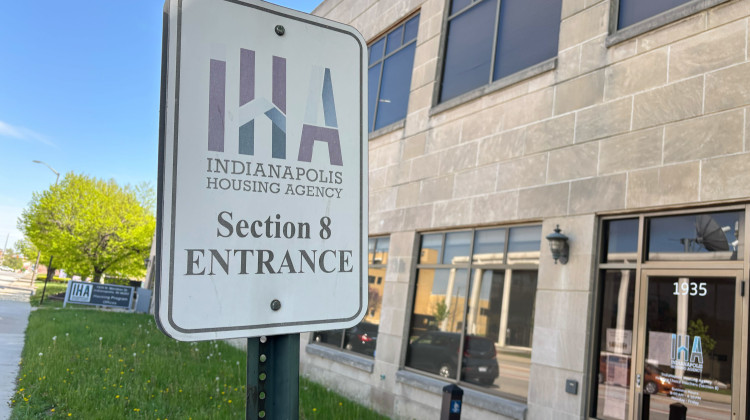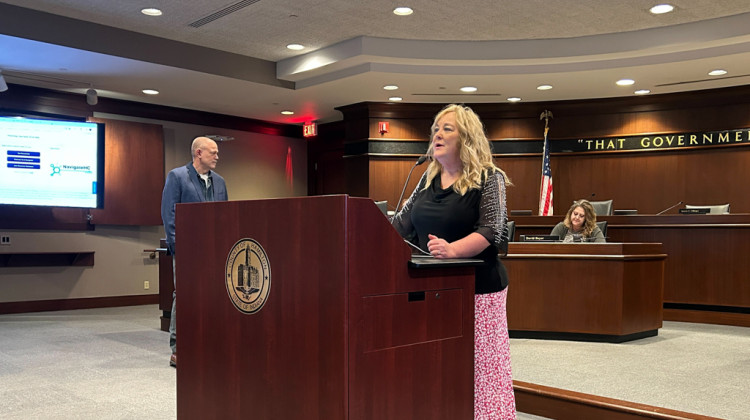
IHA’s mission to aid low-income families, seniors and persons with disabilities in Indianapolis has been mired by years of mismanagement. A federal takeover of the agency in 2024 has resulted in little change..
Abriana Herron / WFYIWith a cane in his right hand, 60-year-old Clifton Jorden walked up to the podium at a recent Indianapolis Housing Agency Board of Commissioners meeting.
During the public comment period, Jorden asked for two things from the agency — better security and parking accommodations at the John Barton Annex apartment complex. There are only three handicapped parking spaces at the facility that houses many seniors.
“The parking is terrible,” he said. “I'm an amputee above the knee, and I still get out and work. I have to park all the way in the back. A couple of times I almost got robbed, and the safety is terrible.”
IHA’s mission to aid low-income families, seniors and persons with disabilities in Indianapolis has been mired by years of mismanagement. A federal takeover of the agency last year has resulted in little change.
Amy Nelson, the executive director of the Fair Housing Center of Central Indiana, said housing authorities across the country are able to effectively provide services to low-income residents without creating hurdles.
“The voucher program helps those who are most vulnerable to being homeless in our community,” she said. “It needs to function correctly, as it does in cities all across America.”
The waitlist to get a housing voucher is currently closed and people can wait well over a year to get assistance.
In the midst of the dysfunction, people with disabilities have consistently had to overcome additional barriers in order to obtain affordable and accessible housing in Indianapolis.
In 2024, IHA did not award any new non-elderly disabled vouchers, according to recent data from a HUD dashboard. The agency has also halted issuing any new vouchers for its primary housing program and sunset its homeless preference voucher distribution in March.
Newly appointed CEO of the agency, Yvonda Bean, said the organization is “committed to providing quality, affordable housing” for the nearly 20,000 marginalized families they serve; however, a decline in federal funding support has created issues with property upkeep.
“It's made it a little more challenging to address the deferred maintenance needs that exist at all of our properties,” she said. “That's across the country. It’s not just specific to IHA.”
According to one federal assessment suggest there’s a nearly $70 billion backlog in improvements for public housing across the country.
If someone with a disability is able to get a voucher, they are not guaranteed housing. A 2014 study from FHCCI shows an 82% refusal rate of people with vouchers in Marion County, and in predominantly white areas that rate went up to 90%.
The aging housing stock both locally and nationwide can also impact accessibility.
In the late 1980s, amendments to the Federal Fair Housing Act added basic accessibility requirements for housing units built after 1991. The problem, Nelson said, is that for anything built before that date there are exceptions.
“So that's a lot of housing, particular older housing, housing that's probably going to be more affordable, that is then not available to those who might have any kind of mobility based impairment as a result,” Nelson said.
An analysis done by the Joint Center for Housing Studies states that less than 4% of housing units nationwide are considered "livable" for people with disabilities, with less than 1% accommodating for people in wheelchairs.
New construction also has to follow the fair housing accessibility policies, but Emily Munson with Indiana Disability Rights said those guidelines don’t provide for the needs of every person with a disability.
“A lot of apartments ignore them and sometimes the structures are built so inaccessibly that, even if they do get sued for violating the Fair Housing Act, there's just no way to retrofit the property, which then means that you have a whole bunch of new housing that is no good for a bunch of people,” she said.
And what works for one person may not for another. The accommodations or modifications a little person may need are completely different from someone with a walker.
Long time voucher holder Kristina Hornaday-Alberts had asked for grab bars to be installed in her shower. She suffered multiple strokes and lost the use of some motor skills. The lack of modifications resulted in a fall that injured her in February 2024. She said she was stuck in the bathtub for two hours with a broken tibia.
“That was one of the big reasons why my landlord just doesn't want to, you know, renew my lease, because she doesn't want the liability anymore,” Hornaday-Alberts said.
The grab bars are an example of a “reasonable modification.” Generally, housing providers are not required to cover these changes. Munson said on the other hand, “reasonable accommodations” are required to be covered for individuals with disabilities.
“An example would be an apartment landlord granting a tenant with a mobility disability a designated accessible parking space, even though the apartment complex’s lot otherwise has a first-come, first-served parking policy,” Munson said in a later statement.
But sometimes people with disabilities do not receive accommodations they requested.
“A lot of times, landlords will refuse,” Munson said, “which again, then requires litigation.”
Hornaday-Alberts has since filed a complaint against IHA citing multiple Fair Housing Act violations. That’s one way that people with disabilities can try to reconcile public housing issues but it can be a long, expensive process.
“It's unacceptable,” she said. “I cannot believe that we're putting disabled people and senior citizens in this condition, and they're being told that nobody cares about them. I mean, they're not saying those words, but by their actions, their actions say way more than their words do.”
In some cases, property management at IHA buildings fell behind on improvements in safety, security and accommodations as the agency failed to fund needed projects.
People with disabilities, like Clifton Jorden, have limited options in those instances. He and others who receive housing through IHA keep showing up to board meetings to ask for improvements.
“I've been there for seven years, and I haven't seen any changes yet,” Jorden said. “I hope that we can get some changes.”
IHA continues to fund vouchers that have already been issued and house people in properties across the city.
Clarification: Language was added to better define the difference between reasonable accommodations and modifications.
Correction: Language was changed in the section about legal requirements for landlords who have tenants with disabilities, to better reflect the nuance of those laws.
Contact WFYI Morning Edition newscaster and reporter Abriana Herron at aherron@wfyi.org.
 DONATE
DONATE






 Support WFYI. We can't do it without you.
Support WFYI. We can't do it without you.